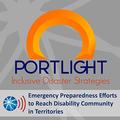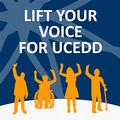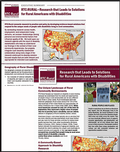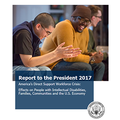News / Document Search Results

3/7/2018
Autism CARES/LEND Act Funding Alert
The President's FY 2019 Budget Request eliminates funding for the Health Resources Services Administration (HRSA) Autism CARES Act programs. This $47 million cut includes the $31.3 million appropriation for LEND programs. The national network of LEND programs would be eliminated. LEND directors, health professionals, trainees, families and allies must educate their Members of Congress about why this training program is important and why it must not be eliminated.

3/7/2018
Emergency Preparedness Efforts to Reach Disability Community in Territories with Support from Portlight Inclusive Disaster Strategies to Association of University Centers on Disabilities
AUCD expands its emergency preparedness efforts with the creation of action steps toward building capacity of Territory emergency preparedness and response made possible by a grant from Portlight Inclusive Disaster Strategies. Five AUCD-member centers will participate in interviews with territory leaders from Guam, Puerto Rico, Northern Mariana Islands, American Samoa, and the U.S. Virgin Islands. The purpose of these interviews is to get insights on the emergency and disaster role of the Centers in all 5 territories and how to better serve children and adults with disabilities before, during and after disasters.

3/7/2018
UCEDD Funding Alert
The President's FY 2019 Budget Request cuts the funding for UCEDDs by $6 million from $39 to $33 million, or more than 15%. In fact, a $5.5 million increase over the expected FY 2018 level is needed to meet the growth of scope of work as related to assisting states to effectively implement recently enacted Federal laws, and the growth of need around autism, Zika, and neonatal abstinence syndrome. UCEDD directors, health professionals, trainees, families, and allies must educate their Members of Congress about why this training program is important, how it serves your state, and why increased funding is needed.

3/6/2018
Partnership Expands Resources Around School Mental Health (IN UCEDD/LEND)
Indiana University's Indiana School Mental Health Initiative (ISHMI) has partnered with The Lutheran Foundation to provide online resources to support schools and community partners as they address students' social, emotional, behavioral, and mental health needs.

3/6/2018
Spectrum Learning Community To Connect Texas A&M Students On Autism Spectrum (TX UCEDD)
By Maggie Rians Texas A&M University Division of Student Affairs
The Texas A&M University Division of Student Affairs will launch a learning community in fall 2018 that will connect students on the autism spectrum.

3/5/2018
Montana UCEDD RTC:Rural Shares Rural Disability and Solution-Focused Research
The Research and Training Center on Disability in Rural Communities (RTC:Rural) at the University of Montana has produced two research summaries that provide an overview of their community-based research. Both documents can be downloaded as accessible PDFs here: Rural Disability and Solution-Focused Research.

3/4/2018
New Gopen & Crocker Fellows (MA UCEDD/LEND)
The 2018 Gopen Fellow, Ashley Quick, joined ICI in early July. She will spend the year focusing on how to help law enforcement better understand and work with people with disabilities. Raquel Quezada, the 2018 Crocker Fellow, continues her work at the ICI in this new capacity after having been a 2017 LEND Fellow. Raquel has developed a radio program dedicated to helping the Latina population learn more about disability resources. Her program is heard weekly on La Mega 95.1FM (or 1400AM) each Saturday at 11am, and will be expanding soon.

3/2/2018
Continue to Educate your Members of Congress on the importance of the Money Follows the Person (MFP) Program
Help people living in nursing facilities and other institutional settings move back into their community!
We applaud all advocates for their continued engagement around the important MFP program. This week is crucial for advocates to continue educating Members of Congress on the positive impact this program has had on the lives of people with disabilities. It is AUCD's hope that MFP will be included in the March 23 omnibus appropriations package. Contact your senators and representatives to educate them on the importance of MFP in order to increase co-sponsors: 03/07: call. 03/08: social media. 03/09: email.

3/1/2018
Spread the Word to End the Word
Join us on March 7
The R-word hurts. It's offensive. It's derogatory. This worldwide campaign asks people to pledge to stop saying the R-word as a starting point toward creating more accepting attitudes and communities for all people. Language affects attitudes and attitudes affect actions. Pledge today to use respectful, people-first language.

3/1/2018
Welcome 2017-2018 Diversity Fellows!
The Administration on Intellectual and Developmental Disabilities (AIDD), in the Administration on Community Living (ACL), awarded National Training Initiative grants to 13 University Centers for Excellence in Developmental Disabilities (UCEDDs) to support the recruitment and retention of trainees from culturally and linguistically diverse backgrounds to participate in a fellowship experience at the UCEDD with opportunities to make systemic change through a capstone project and community-based activities.

2/28/2018
South Dakota LEND Trainees Experience the State Legislative Process
Leadership is the first word in the full definition of LEND. Underlying leadership are a dozen MCH competencies. The South Dakota Leadership Education in Neurodevelopmental and Related Disorders (LEND), housed at the Center for Disabilities in the University of South Dakota Sanford School of Medicine, takes one of those competencies-Policy and Advocacy-and engages its LEND trainees in an immersion experience with the policy makers and influencers in the state.

2/26/2018
AUCD Network Involvement in Public Health
Take Survey by March 6
AUCD is working on a summary of the Network's involvement in public health activities. Please take this 10-minute survey as soon as possible, and no later than March 6. This will help us as we wrap up our current CDC cooperative agreement and make plans for our competitive application for the next cycle.

2/25/2018
March is Developmental Disabilities Awareness Month
See Me for Me!
During this month, we want people to share their stories, photos, and resources far and wide to expand the conversation of inclusion and accessibility. This year's theme is "See Me for Me!" To us, this means looking beyond someone's disability and seeing them as a person and not just a person with a disability.

2/20/2018
President's Fiscal Year 2019 Budget
Analysis of the Impact on People with Disabilities
President Donald Trump on February 12 released his budget proposal to Congress for Fiscal Year 2019, which will cover October 1, 2018-September 30, 2019 (FY19). The entire budget can be found on the White House homepage. In general, President Trum's budget, titled "Efficient, Effective, Accountable: An American Budget," would dramatically impact Americans with disabilities, with cuts far deeper than any ever enacted. The Association of University Centers on Disabilities (AUCD) examines the budget's cuts to the national network of university-based interdisciplinary programs, key disability programs, research, and a broad set of public services critical to the lives of people with disabilities.

2/15/2018
In Memoriam: Gordon Richins (UT UCEDD)
Gordon Richins, Consumer Liaison at the Center for Persons with Disabilities in Utah and former 2-term COCA Co-Chair, passed away on February 11. He leaves a hole at the CPD, and in many other places where his influence was felt.

2/14/2018
PCPID Releases Report on Direct Support Workforce
President's Committee for People with Intellectual Disabilities (PCPID) chaired by and includes several AUCD members
The President's Committee for People with Intellectual Disabilities (PCPID) has released its 2017 report, America's Direct Support Workforce Crisis: Effects on People with Intellectual Disabilities, Families, Communities and the U.S. Economy. Direct support professionals (DSPs) provide services and supports that empower people with intellectual disabilities to live in the community. In the report, PCPID notes that DSPs promote participation in the U.S. economy "by helping people with an (intellectual disability) get jobs and by enabling family members to work." The report describes the current state of the DSP workforce as a "crisis," noting that the average DSP wage is $10.72, most work two or three jobs, and the average annual DSP turnover rate is 45%.







